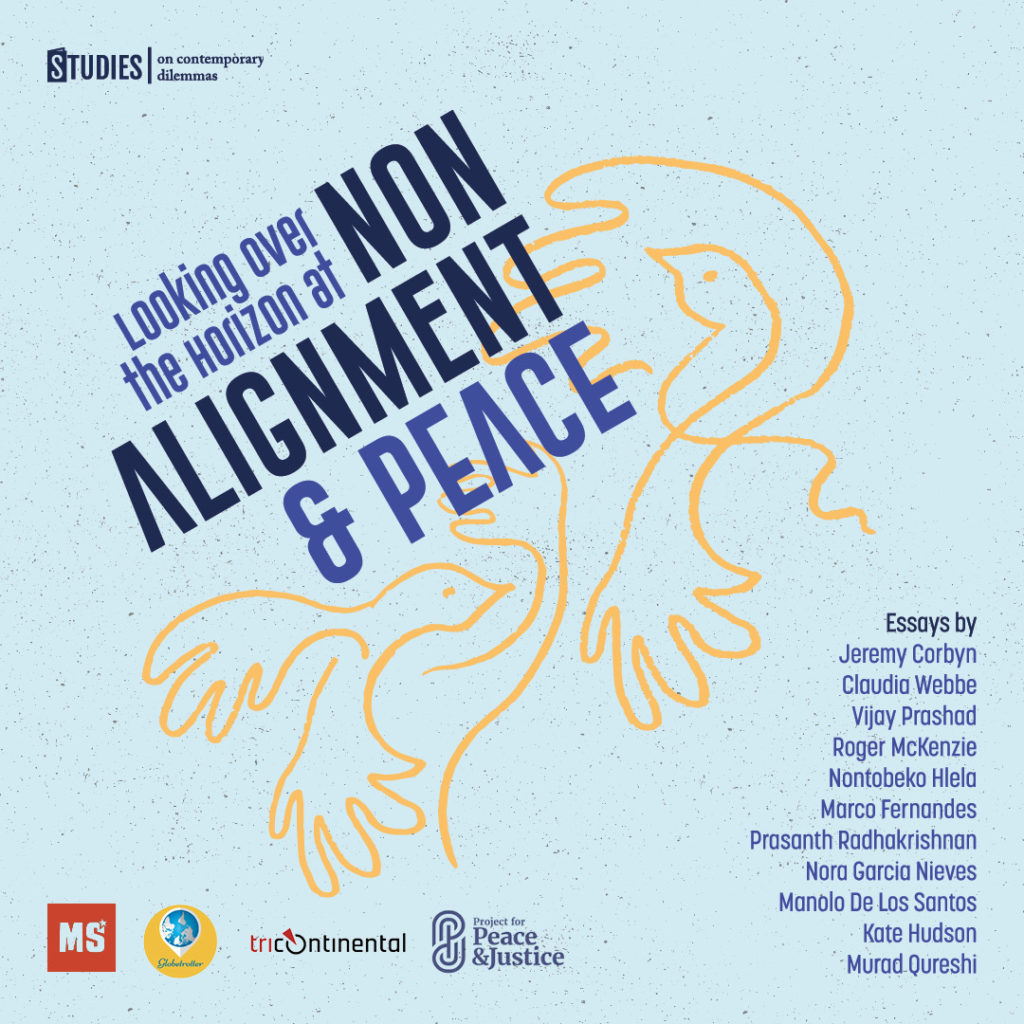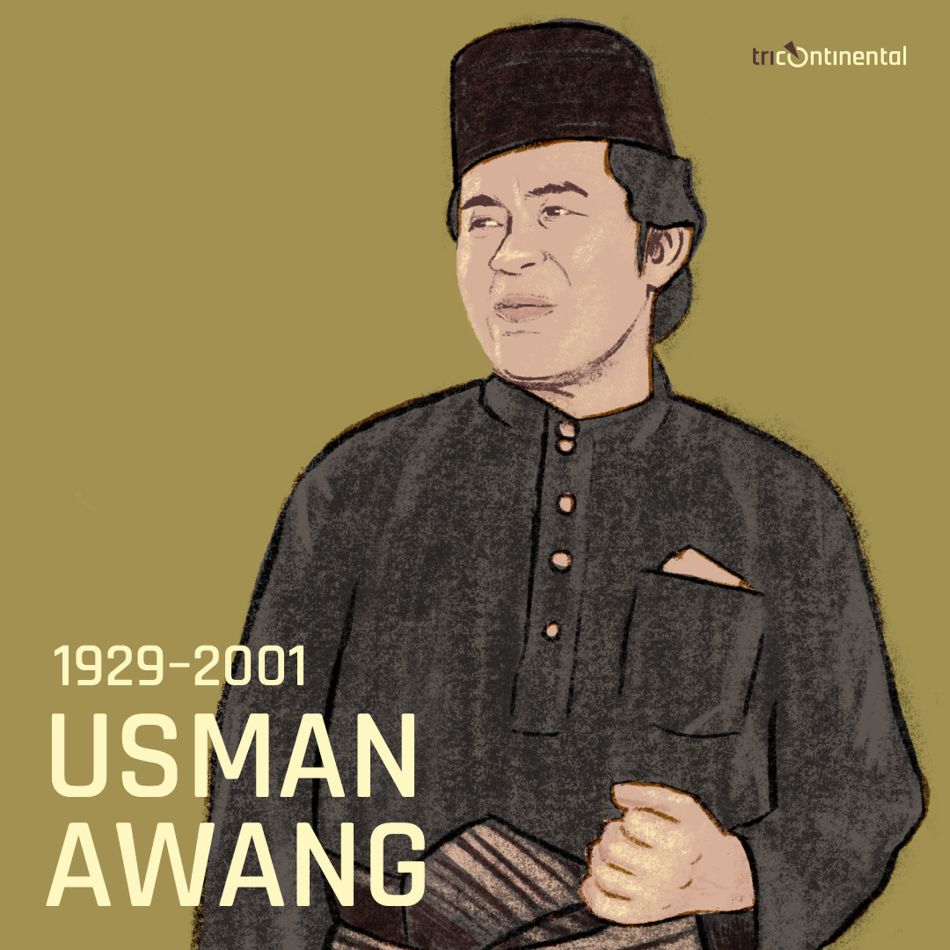Calls for peace must be as powerful as calls to save the planet from the climate catastrophe, writes Vijay Prashad.

León Ferrari, Argentina, “Sermon of the Blood,” 1962.
By Vijay Prashad
Tricontinental: Institute for Social Research
 Since 1947, the Doomsday Clock has measured the likelihood of a human-made catastrophe, namely to warn the world against the possibility of a nuclear holocaust.
Since 1947, the Doomsday Clock has measured the likelihood of a human-made catastrophe, namely to warn the world against the possibility of a nuclear holocaust.
The Bulletin of the Atomic Scientists, which attends to this clock, originally set the device at seven minutes to midnight, with midnight being, essentially, the end of the world. The farthest that the clock has been from midnight was in 1991, when it was set at 17 minutes from midnight.
The closest to midnight that the clock has been is now. Since 2020, the clock has sat at “doom’s doorstep” – 100 seconds from midnight. The motivation for this alarming setting was the unilateral withdrawal by the United States from the Intermediate-Range Nuclear Forces Treaty in 2019. This is the “most dangerous situation that humanity has faced,” said former President of Ireland and former United Nations High Commissioner for Human Rights Mary Robinson.
To contribute to the dialogue about this “most dangerous situation,” Tricontinental: Institute for Social Research has launched a new series of texts called Studies on Contemporary Dilemmas.
These dilemmas include the pressing questions of the climate and environmental catastrophe, the wastefulness of military spending and the perils of warfare, and the deepening sensibility of despair and individualism.
The solutions to these dilemmas are not beyond our capacity to resolve; our planet contains the resources needed to address them. We do not lack in ideas or resources; the problem is that we lack in political power.
Elements of the policies needed in the world have been sitting in amber inside the United Nations Charter for decades, ignored by those who hoard power, privilege, and property.
Our Studies on Contemporary Dilemmas are intended to stimulate debates around the broad issues of our times with the hope that these debates will galvanise social forces to prevent the impending doomsday.

Takano Aya, Japan, “Dun Huang’s Room,” 2006.
The first study in this series, produced in collaboration with Monthly Review and No Cold War, is called The United States Is Waging a New Cold War: A Socialist Perspective. The essays in this text provide a close assessment of the policy of the United States, which aims to maintain its control over the international system, including through its pursuit of nuclear primacy and willingness to launch even a “limited nuclear war” to attain its ends.
A simulation of nuclear war conducted by Princeton University in 2020 showed that if even one tactical strike is made by any nuclear power, it could result in the immediate death of 91.5 million people; “deaths from nuclear fallout and other long-term effects would significantly increase this estimate,” wrote the researchers.
In our study, John Bellamy Foster, editor of Monthly Review, writes: “Just as the full destructive implications of climate change threatening the very existence of humanity are in large part denied by the powers that be, so are the full planetary effects of nuclear war, which scientific research about nuclear winter tells us will effectively annihilate the population of every continent on Earth.”
Our calls for peace, therefore, must be as powerful as our calls to save the planet from the climate catastrophe.

Dia Al-Azzawi, Iraq, “Ijlal li Iraq” or “Homage to Iraq,” 1981.
In the aftermath of the U.S. nuclear strikes on Hiroshima and Nagasaki in 1945, the World Peace Council issued the Stockholm Appeal:
“We demand the outlawing of atomic weapons as instruments of intimidation and mass murder of peoples. We demand strict international control to enforce this measure.
We believe that any government which first uses atomic weapons against any other country whatsoever will be committing a crime against humanity and should be dealt with as a war criminal.
We call on all men and women of good will throughout the world to sign this appeal.”
Within two weeks, 1.5 million people had signed the appeal.
Donate Today to CN’s
2022 Fall Fund Drive
In 1947, the hibakusha (the survivors of the nuclear attack) and Hiroshima’s then mayor, Shinzo Hamai, initiated Hiroshima Day, which has since become an annual ceremony on Aug. 6.
The Peace Bell at Hiroshima’s Peace Memorial Museum and Park rings at 8:15 am, the exact moment when the bomb exploded, and paper cranes and paper lanterns float on the water near Genbaku Dome, the only building left standing from the carnage.
The importance and vitality of Hiroshima Day has now withered. It is imperative to revive such a day as part of the process of rescuing the collective life.

Dia Al-Azzawi, Iraq, “Ijlal li Iraq” or “Homage to Iraq,” 1981.
Our second study in this series began to take shape a month into the war in Ukraine, when Tricontinental: Institute for Social Research began a conversation with Jeremy Corbyn, a member of the U.K. Parliament and former leader of the U.K. Labour Party, and his team at the Peace and Justice Project.
We felt that there was an urgent need to stimulate the peace movement with a discussion about the various catastrophes that had begun to ripple outward from Ukraine, including galloping inflation.
We invited a range of writers from Brazil to the United Kingdom, from South Africa to India, to reflect on the immediate crisis through the vital concept of nonalignment, which was born in the anti-colonial struggles of the 20th century and institutionalised in the Nonaligned Movement (1961).
These essays – produced in collaboration with Morning Star, Globetrotter, and the Peace and Justice Project – have now been published as “Looking Over the Horizon at Nonalignment and Peace,” Studies on Contemporary Dilemmas no. 2.
In his contribution to the booklet, Corbyn reflects on the idea of peace for our times:
“Some say to discuss peace at a time of war is a sign of some kind of weakness; the opposite is true. It is the bravery of peace protesters around the world that stopped some governments from being involved in Afghanistan, Iraq, Libya, Syria, Yemen, or any of the dozens of other conflicts going on.
Peace is not just the absence of war; it is real security. The security of knowing you will be able to eat, your children will be educated and cared for, and a health service will be there when you need it. For millions, that is not a reality now; the aftereffects of the war in Ukraine will take that away from millions more.
Meanwhile, many countries are now increasing arms spending and investing resources in more and more dangerous weapons. The United States has just approved its biggest-ever defence budget. These resources used for weapons are all resources not used for health, education, housing, or environmental protection.
This is a perilous and dangerous time. Watching the horror play out and then preparing for more conflicts in the future will not ensure that the climate crisis, poverty crisis, or food supply is addressed. It’s up to all of us to build and support movements that can chart another course for peace, security, and justice for all.”
Such a clear statement for a world of peace is the antidote we need to address what Mary Robinson has warned us is the “most dangerous situation that humanity has ever faced.”
 At the side lines of the United Nations General Assembly, 19 member states of the Group of Friends in Defence of the Charter of the United Nations met to discuss the need to strengthen multilateralism to “forge collective, inclusive, and effective solutions to the common challenges and threats of the 21st century.”
At the side lines of the United Nations General Assembly, 19 member states of the Group of Friends in Defence of the Charter of the United Nations met to discuss the need to strengthen multilateralism to “forge collective, inclusive, and effective solutions to the common challenges and threats of the 21st century.”
Collective and common: these need to be our keywords. Less division, more collectivity; less building for war and more building for peace.
The language of the Group of Friends is in the lineage of the Nonaligned Movement and the African-Asian Conference, held in Bandung, Indonesia, in 1955.
As the leaders of the new post-colonial states met in Bandung to talk about nonalignment and peace, the Malaysian socialist poet Usman Awang (1929–2001) wrote Bunga Popi (“Poppies”), a poem about the ugliness of war:
From blood, from pus that rots in the soil,
from skeletons that have lost their lives,
snatched by weapons,
the result of war maniacs who kill love,
the red flowers bloom beautifully,
requesting to be adored.
Vijay Prashad is an Indian historian, editor and journalist. He is a writing fellow and chief correspondent at Globetrotter. He is an editor of LeftWord Books and the director of Tricontinental: Institute for Social Research. He is a senior non-resident fellow at Chongyang Institute for Financial Studies, Renmin University of China. He has written more than 20 books, including The Darker Nations and The Poorer Nations. His latest books are Struggle Makes Us Human: Learning from Movements for Socialism and, with Noam Chomsky, The Withdrawal: Iraq, Libya, Afghanistan, and the Fragility of US Power.
This article is from Tricontinental: Institute for Social Research.
The views expressed are solely those of the author and may or may not reflect those of Consortium News.
Donate Today to CN’s
2022 Fall Fund Drive
Donate securely by credit card or check by clicking the red button:


Something like this should be proposed on highest U.N. levels ^^
A reminder-
It is a challenge to transition the giant industries including all the connected “jobs” from a destructive towards a constructive process/ progress.
There is really a lot(!) to do to “repair”- looking at the human/ industrial made huge social and environmental damage in history and at present around the planet (including the oceans).
Let’s shift (almost in the first place) the military budget (~ 2 trillion dollars per year) in a step by step international binding agreement within a 12 year time-frame to regenerating nature and social balance.
The attached industries will follow consequently.
Let our (military) guys and girls be good “forces”/ stewards for a healthy and as far as possible resilient planet, and a socially stable global society including all wonderful creatures sharing the world with us.
By training the staff correspondingly and thoroughly.
That would be really great & smart for national and global security!
And lets make them finally undertake the long overdue clean up of all the highly dangerous, poisonous and tremendous mess, the military and their industries have been leaving or dumping about everywhere around the planet during and after past (world) wars.
Including the deadly nuclear waste time bombs rotting somewhere.
Dangerous work for decades.
There is only one garden Eden we very likely are ever able to reach ^^
The entire weapon industry (military- industrial complex) must become state owned and controlled for no monetary profit.
Just maintained for the really necessary defence needs.
Not more than that!
And this can be probably done very well with just ~10% of the present budget/ cost in about every country.
In the hands of a shareholders dictated industry they always will be looking for more profit every single day and year by year.
And if there is no conflict/ crisis they will create one at its “best”. They even are in for multiple conflicts/ crisis if maximum profit is on the horizon.
Again and again, always based on malicious propaganda, spread by “government” agencies, evil willing „think tanks“ and allied media.
Accepting/ causing millions of civil deaths and natures destruction.
There is a choice for what to use global yearly military spending’s…
… of now more than 2.000.000.000.000,. $ each year.
We got to want it and insist on it!
I really don’t think that the US wants peace. It has built its economy on a war industry and the exploitation of other countries’ resources. There are those in the US who think that its only hope of maintaining its global hegemonic position is war with Russia and China to prevent them from becoming powerful enough to ‘contain’ it.
But there are also many who think that its time for preventing Russia and China is rapidly running out, and that it must strike soon, or it will be too late. These same people also think that nuclear war is winnable! This, in my view, is what raises the risk enormously.
“Our calls for peace, therefore, must be as powerful as our calls to save the planet from the climate catastrophe.”
These calls are not exactly working well.
Private concentrations of wealth equate to private concentrations of political power.
I don’t think I have any say at all in global affairs, international politics or war for profit.
I don’t have the private wealth to get a say.
I am ruled, not represented.
So are you.
I will not share blame for that which powerful, broken people do.
What they do to us all, is much like what a rabid dog would do if someone crowned it king…
…but then the sales department (politicians, media, advertising) spins a narrative that it is actually good that the savage mauling of millions is occurring, and is justified, and moral (wave-flag-harder).
We aren’t in a system of laws and consent. We are ruled by the rabid, who have a highly effective PR department.
If climate preservation reduces the wealth and power of the powerful, it will not be done.
If peace reduces the wealth and power of the powerful, it will not be done.
I’ve been watching.
Well put.
US GO HOME! A BAS L’OTAN ! NON A LA GUERRE NUCLEAIRE EN EUROPE ! NON A LA GUERRE AMERICAINE CONTRE LA RUSSIE !
L’OTAN n’est pas partie au conflit russo-ukrainien
— secrétaire général de l’Alliance, le 30 septembre 2022
Une victoire russe dans le conflit en Ukraine serait une défaite pour l’OTAN et ne devrait pas être permise
— secrétaire général de l’Alliance, le 11 octobre 2022
Le bombardier stratégique américain “invisible” B-2 Spirit est arrivé en Pologne selon les médias. Cet avion peut transporter 16 missiles de croisière avec des ogives nucléaires. Charge de combat jusqu’à 27 000 kg.
“La victoire de la Russie dans le conflit en Ukraine sera la défaite de l’OTAN, cela ne peut être autorisé” vient de déclarer le Secrétaire général de l’alliance. Stoltenberg rajoute que “L’OTAN organisera des exercices de dissuasion nucléaire la semaine prochaine.” En même temps, il a également déclaré que Bruxelles “n’avait encore remarqué aucun signe de menace de la part de la Russie d’utiliser des armes nucléaires.”
11 OCTOBRE, 11:57
La victoire de la Russie dans le conflit en Ukraine serait la défaite de l’OTAN — Stoltenberg
Jens Stoltenberg a souligné que l’OTAN doit se préparer à une longue guerre en Ukraine
Le secrétaire général de l’OTAN, Jens Stoltenberg AP Photo/Olivier Matthys
Secrétaire général de l’OTAN, Jens Stoltenberg
©AP Photo/Olivier Matthys
BRUXELLES, le 11 octobre. /TASS/. La victoire de la Russie dans le conflit en Ukraine serait une défaite pour l’OTAN, l’alliance ne doit pas permettre une telle issue, a déclaré mardi le secrétaire général de l’organisation, Jens Stoltenberg, lors d’une conférence de presse avant les réunions des ministres de la Défense de l’OTAN les 12 et 13 octobre à Bruxelles.
“Il est important pour nous tous que l’Ukraine gagne la bataille. Parce que si [le président russe Vladimir] Poutine gagne, ce n’est pas seulement une grande défaite pour les Ukrainiens, mais ce sera une défaite et dangereuse pour nous tous, parce que cela rendra le monde plus dangereux et cela nous rendra plus vulnérables à une nouvelle agression russe », a-t-il déclaré.
Stoltenberg a souligné que l’OTAN doit se préparer à une longue guerre en Ukraine. “Je pense que nous devons juste être préparés pour le long terme (pour fournir un soutien à l’Ukraine – TASS)”, a-t-il ajouté.
The atomic scientists behind the Doomsday Clock have been saying this for several years. They see not only the original, ‘classic’ threat to human society in Global Nuclear War, but also the now additional threat because of human activities distorting the climate of the planet.
The catch is, that humanity has to run this obstacle course of existential threats with a perfect score. It does not help to clear one hurdle, only to fall at the other jump. That still gets the big cosmic game-show buzzer fail sound on ‘humanity’. A 50-50 outcome does not result in a ‘draw’ and drinks all around. Since humanity has deliberately put itself into this position, humanity now requires a perfect 2 for 2 to get out of here alive.
Of course, politicians love problems that are to be solved after their careers and lifetimes are passed. Their favorite type. They love to make big plans for how the problem will be solved …. after they are gone. Thus, the politicians who know they won’t be in office more than another decade, promise to solve Climate Change by 2050. While trying to deescalate this current existential crisis and find peace would hurt the immediate flow of money out to their corporate sponsors. Which of course leads to immediate angry phone calls from their owners and masters. A bad day for a politician.
The politicians would much rather focus on a plan to save the planet a couple of decades after they are dead and in the ground. And so it goes ….
One should be very careful citing the Bulletin of the Atomic Scientists these days. I’m not sure exactly when it happened, but sometime after 2016 or so it seems like the organization was infiltrated or taken over by national security state propagandists. Rather than doing everything they possibly can to protect the world from nuclear Armageddon, for the past few years now they have been writing article after article pushing anti-Russia and anti-China propaganda.